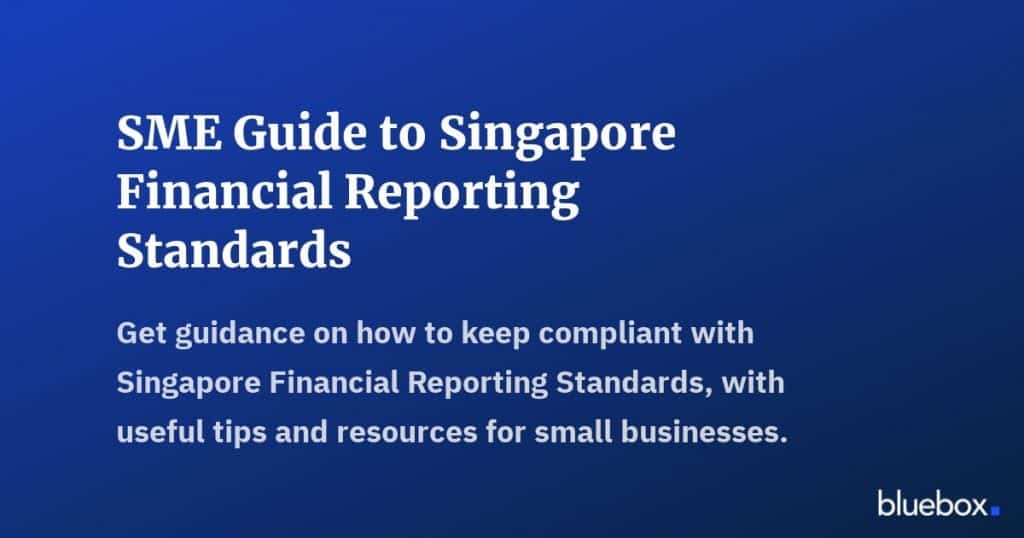Financial reporting is an essential part of any small business. In Singapore, the financial reporting standards are set by the Accounting Standards Council in accordance with the International Financial Reporting Standards. This guide provides a comprehensive overview of the Singapore Financial Reporting Standards (SFRS) for small businesses. It outlines key aspects of SFRS, from recognizing and measuring assets to determining when a transaction should be reported. Furthermore, it explains how to prepare and present financial reports in accordance with SFRS and provides guidance on key considerations when preparing financial statements for small businesses operating in Singapore. By understanding these guidelines, small business owners can ensure their financial reports are compliant with SFRS and help them make informed decisions about their business finances.
The Singapore Financial Reporting Standards (SFRS) provide guidance on how to prepare and present financial reports for entities operating within the country. The SFRS require that companies recognize, measure, and report their assets according to specific criteria in order to meet compliance requirements. This guide explains the different elements of SFRS, including recognition criteria, measurement rules, presentation requirements, disclosure policies, and more. Additionally, it discusses important considerations for small businesses preparing their financial statements under the SFRS framework such as taxation matters and cash flow analysis techniques.
By following this guide, small business owners will gain a better understanding of how to prepare their financial reports according to Singapore’s Financial Reporting Standards. They will learn how to identify relevant transactions and prepare accurate financial statements which are compliant with SFRS regulations. Furthermore, they will be able to make more informed decisions about their business finances based on insightful data provided by properly prepared financial reports.
The Role Of Global Accounting Standards
The global economy has continually increased its reliance on international financial reporting standards (IFRS) to ensure the credibility and accuracy of financial statements. IFRS are a set of guidelines that provide a framework for preparing and presenting financial reports in a uniform manner. They are designed to make it easier for investors and other interested parties to understand and analyze the information contained in such reports. By making financial statements more reliable, transparent, and comparable, IFRS allows users of financial statements to make better decisions.
IFRS have become an important tool for businesses of all sizes, including small businesses, as they strive to achieve their goals. With these standards in place, small business owners can better manage their finances as well as prepare timely and accurate financial statements that are compliant with IFRS requirements. Moreover, by having access to this type of information, investors can make informed decisions about how best to allocate their resources. Additionally, governments around the world rely on IFRS-compliant financial statements when assessing taxes or making policy decisions. Therefore, it is clear that the implementation of IFRS has had a profound impact on businesses worldwide.
International Financial Reporting Standards (IFRS)
The International Financial Reporting Standards (IFRS) are a set of global accounting standards, issued by the International Accounting Standards Board (IASB). They provide guidance on how entities should report their financial activities. The IFRS are applicable to annual periods beginning on or after 1 January 2021 and they replace Singapore Financial Reporting Standards (SFRS).
The IFRS are comprised of official pronouncements, interpretations, framework and other documents of the IASB. They constitute a comprehensive set of rules that provide guidance on the recognition, measurement and disclosure of transactions in the financial statements. The IFRS also contain requirements for disclosure practices, including disclosure requirements related to fair value measurements. The IFRS enable entities to present their financial performance in accordance with a uniform set of international standards.
The implementation of the IFRS in Singapore is an important step towards enhancing transparency in financial reporting and promoting harmonization between countries. It enables investors to make informed decisions about investments in companies based in different countries by providing them with comparable financial information across jurisdictions. Additionally, it strengthens global capital markets by providing more reliable information for investors and analysts.
Singapore Financial Report Standards (SFRS)
The Singapore Financial Reporting Standards (SFRS) are a set of accounting practices and principles that govern the financial reporting of entities in Singapore. They provide guidelines for preparing accurate and reliable financial statements, which are used for decision making by stakeholders such as investors, creditors, auditors and regulators. A complete understanding of the SFRS is necessary for businesses operating in Singapore in order to stay compliant with local regulatory requirements.
The SFRS covers topics such as recognition, measurement, presentation and disclosure of information related to entity’s assets, liabilities, equity, income and expenses. It outlines the principles for recognizing revenue and expenses based on when they occur rather than when they are paid or received. This helps companies accurately report their annual revenue while presenting a fair view of their financial position. Additionally, the SFRS requires companies to disclose any uncertainties or risks that may affect the accuracy of their reported figures. This allows users of financial statements to make informed decisions based on an understanding of all potential risks associated with the company’s operations.
Overall, complying with SFRS is essential for businesses operating in Singapore as it enables stakeholders to have access to reliable information on which they can base their decision-making process. The standards provide guidance on how entities should prepare and present their financial statements so that these reports can be relied upon by investors and other stakeholders.
Singapore Financial Reporting Standards For Small Entities (SFRS For SE)
Singapore’s Accounting Standards for Small Entities (SFRS for SE) is a set of accounting standards designed to meet the needs of small businesses. The SFRS for SE is intended to provide a simplified version of the Singapore Financial Reporting Standards (SFRS) that are applicable only to entities whose public accountability is limited. This includes entities such as sole proprietorships, partnerships, and private companies with no more than 20 shareholders.
The SFRS for SE provides guidance regarding financial reporting requirements and disclosure requirements applicable only to small business entities. It also provides guidance on the preparation and presentation of financial statements in accordance with accepted accounting principles. Additionally, SFRS for SE outlines how archived documents should be maintained and preserved in order to ensure accurate records are kept over time. With respect to archiving documents, it requires that small business entities maintain organized records throughout their operations so that information can be retrieved quickly when needed.
In this way, SFRS for SE assists small business owners to properly manage their finances and ensure that financial reports comply with all relevant standards. This helps them secure better financing arrangements from lenders, as well as creating greater transparency in their financial statements which can help build trust among investors or other stakeholders in the business.
Does My Business Qualify To Use SFRS For SE?
Small enterprises (SEs) in Singapore are eligible to use the Singapore Financial Reporting Standards (SFRS) for SE. To qualify, a business must meet certain criteria set out by the Accounting and Corporate Regulatory Authority (ACRA). First, the business must have an annual revenue below S$10 million. Second, it must not be a listed company or an entity that is required to prepare financial statements according to SFRS(I). Third, if a business has subsidiaries or associates, its consolidated revenue must be less than S$10 million. Fourth, the entity should not be an insurer, a bank or other financial institution.
Additionally, companies can apply to ACRA for exemption from using SFRS for SE if they believe their financial statements do not reflect their true economic position. The application should include evidence of why the SFRS for SE does not accurately reflect their financial performance and liquidity. ACRA will make a decision based on this evidence as well as other factors such as whether the company’s operations are complex and its size. If approved, companies may continue to use previous accounting standards instead of adopting SFRS for SE.
Choosing To Use SFRS Or SFRS For SE For Your Business
When deciding which financial reporting standards to use, it is important to consider the size and complexity of your business. Singapore Financial Reporting Standards (SFRS) are generally applicable to any company regardless of size or complexity. However, if your business is a small- or medium-sized entity (SME), you may choose to use SFRS for Small Entities (SFRS for SE).
The major difference between SFRS and SFRS for SE is that the latter has been simplified to be more applicable and easier to apply for SMEs. SFRS for SE eliminates certain disclosures which may not be relevant or applicable to SMEs, while still providing investors with sufficient information about the financial performance and position of an entity. This can help make financial reporting easier and less time consuming for SMEs. Other differences include different accounting treatments for leases, intangible assets, inventories, investment properties and joint arrangements.
Choosing between SFRS or SFRS for SE depends on various factors such as the business’s size, complexity and its stakeholders’ information needs. It is important that businesses are aware of their options so that they can make informed decisions when selecting their preferred financial reporting standards. An accountant or other specialist with experience in small business accounting should be consulted before making a decision on which standard to use.
Conclusion
The adoption of global accounting standards such as International Financial Reporting Standards (IFRS) and Singapore Financial Report Standards (SFRS) is essential for the success of businesses in the modern marketplace. The SFRS has been further adapted to meet the needs of small entities with the introduction of Singapore Accounting Standards for Small Entities (SFRS for SE). This has allowed small entities to benefit from a simplified set of reporting standards that still meet the goal of providing reliable financial information.
Businesses must weigh their individual needs when deciding whether to use SFRS or SFRS for SE. It is important to analyze the costs associated with each standard, as well as consider the complexity that may be involved in maintaining separate sets of books if both standards are used. Additionally, it is important to review the potential effects on taxation and other financial impacts before making a decision.
In conclusion, it is essential for businesses to understand their options when it comes to adopting global accounting standards, particularly when it comes to choosing between SFRS and SFRS for SE. Businesses should assess their individual needs and potential impacts before deciding on which standard best meets their requirements. By doing so, they will ensure that they are able to access reliable financial information while minimizing burdensome costs and complexities associated with adapting different standards.

